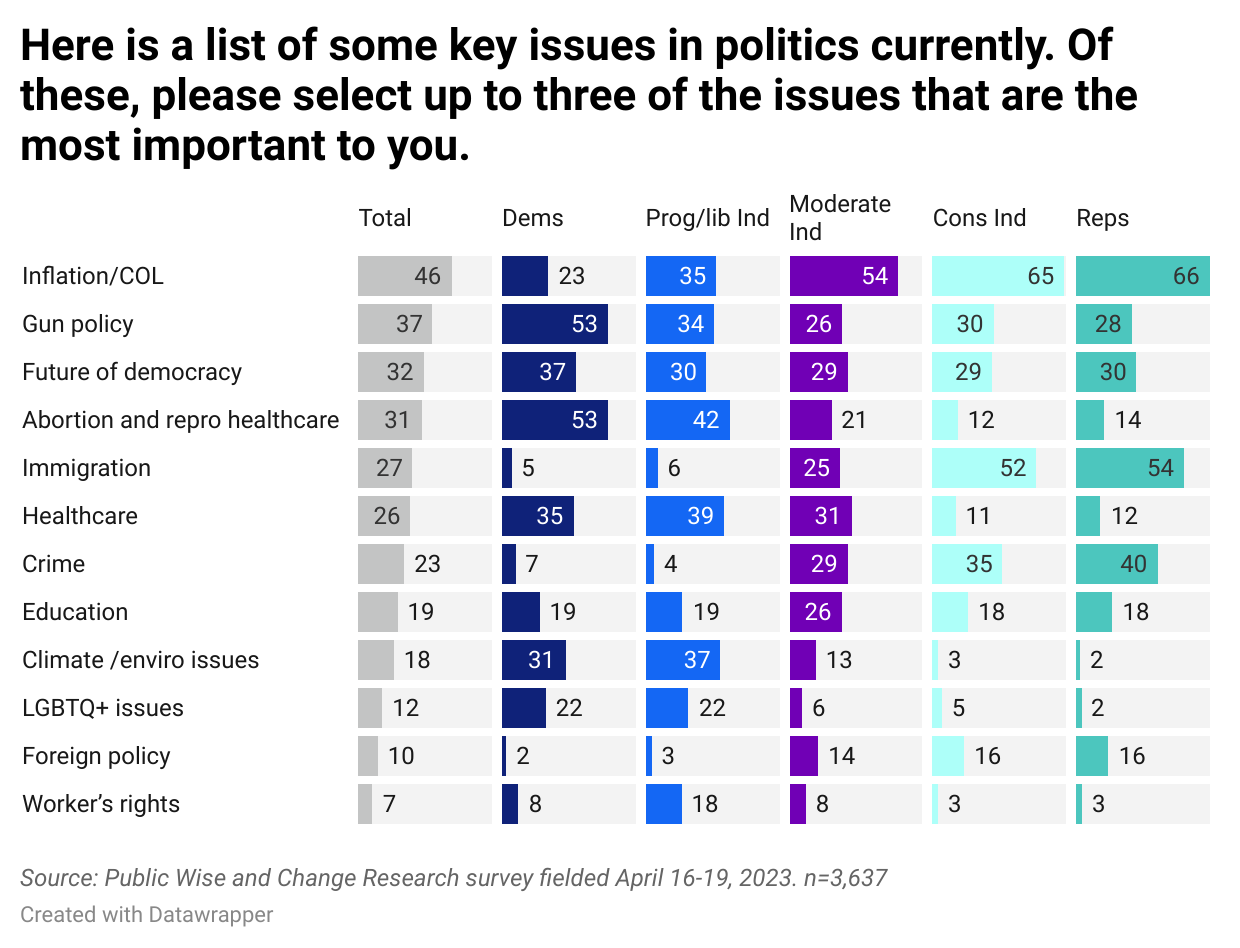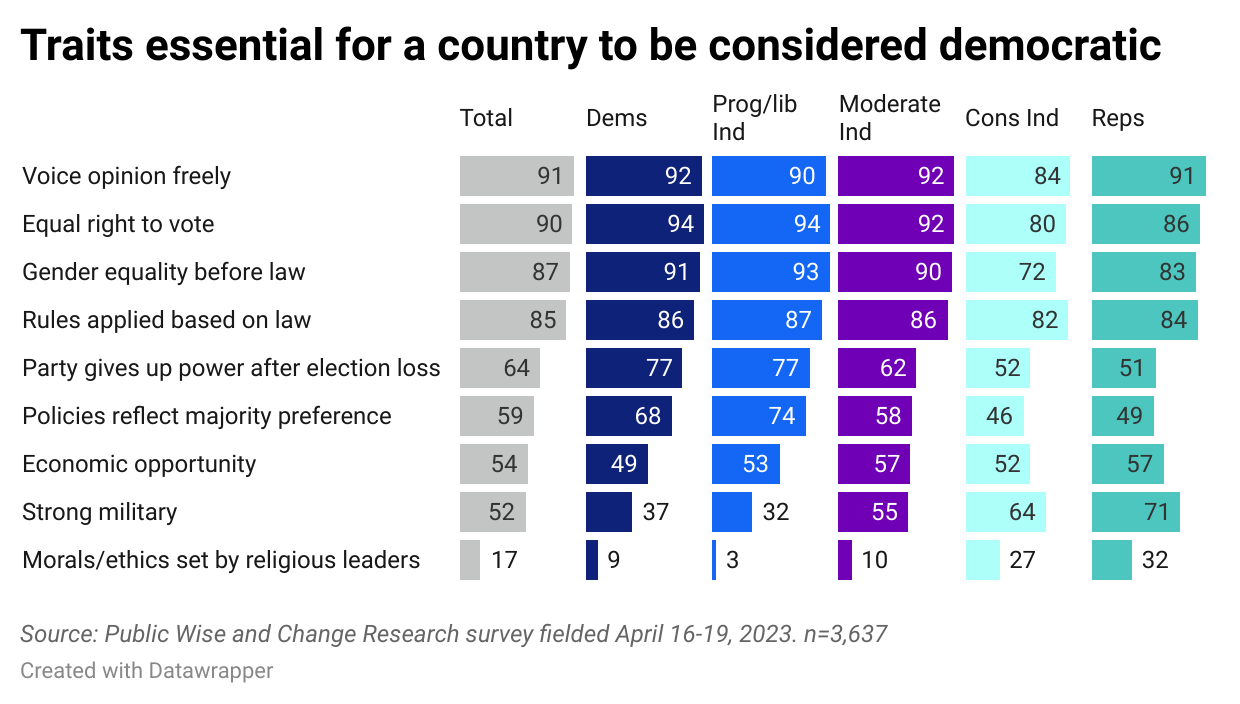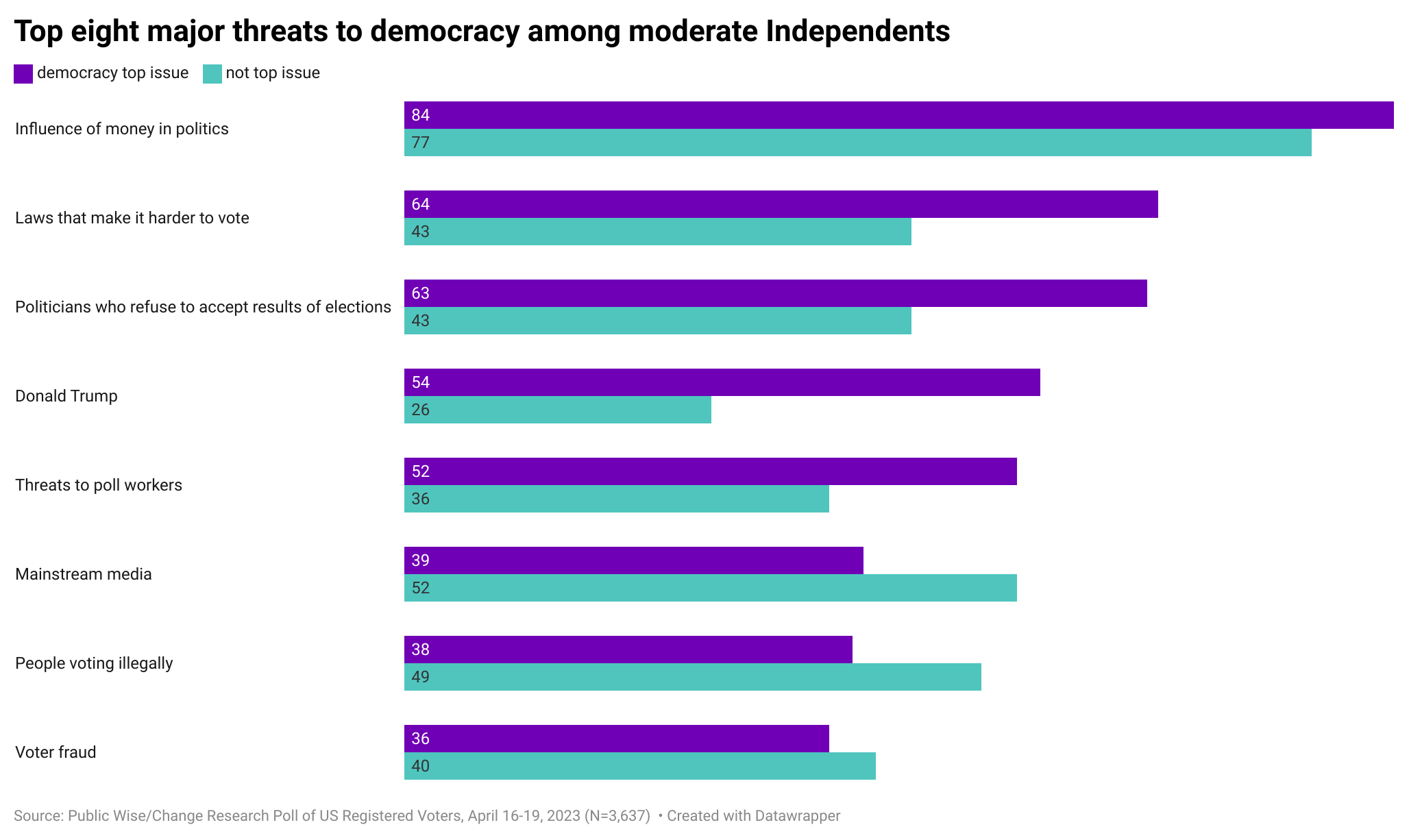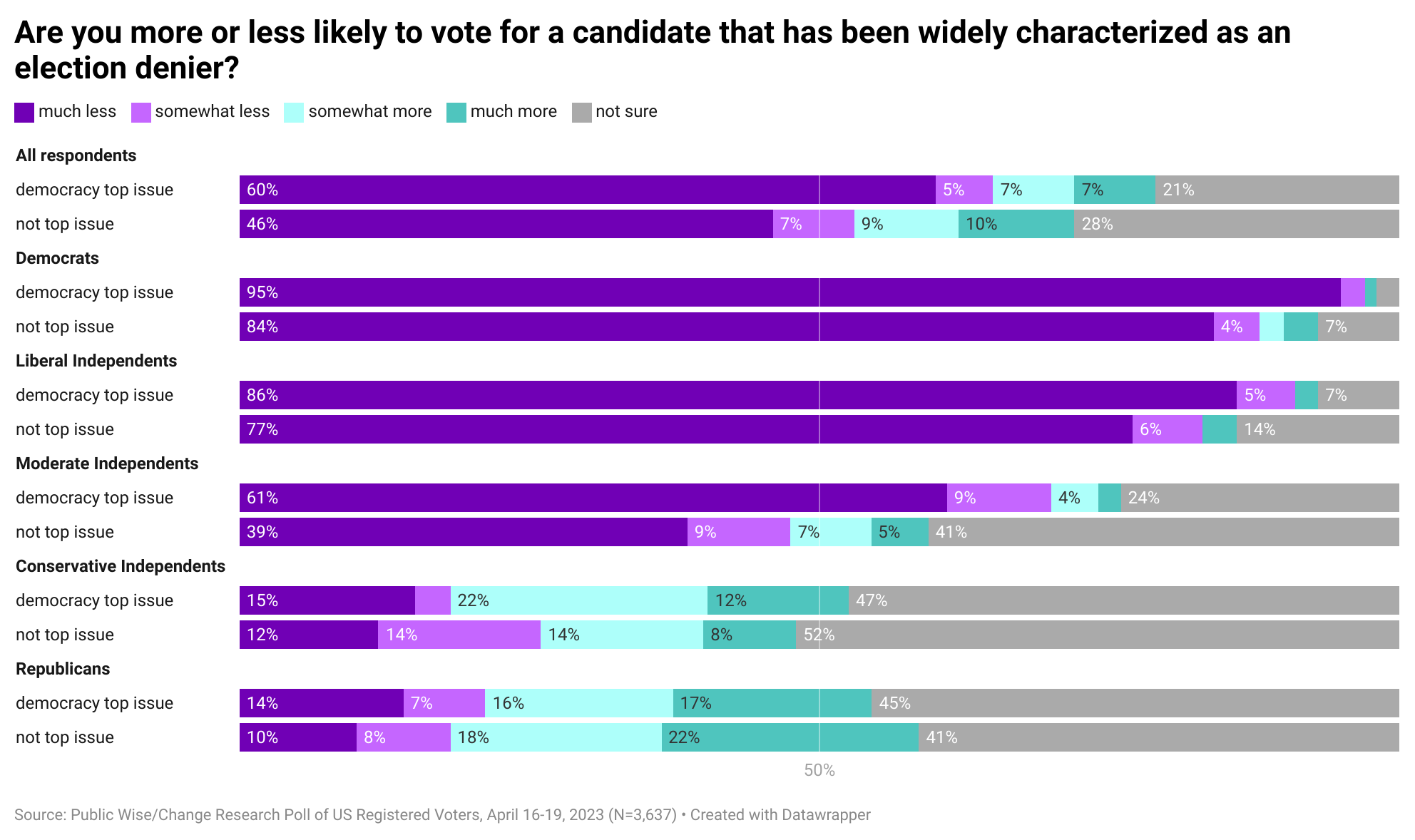What is a democracy, what threatens it, and does it matter? Views of U.S. registered voters.
Key takeaways
- Many Americans do not seem to understand the connection between democracy and the current political issues they care about. People seeking to emphasize the importance of democracy, whether as an issue or in relation to a candidate, should make these connections explicit as part of evidence based communications strategies.
- For Democrats, the most important issues are gun policy, abortion, and the future of democracy.
- For Republicans, inflation/cost of living, immigration, and crime.
- The future of American democracy was the third most important political issue for all registered voters, ranking as more important overall than reproductive rights. However, Democrats and left-leaning Independents ranked democracy behind both reproductive rights and gun policy, indicating they may not fully appreciate how these top issues depend on a functioning democracy.
- Our evidence suggests that believing democracy is a top political issue is directly related to being less likely to vote for an election denying candidate. Those working to protect democracy should consider messaging that explicitly explains the threat election denial poses to democracy.
- Most registered voters agree that four things – freedom to voice opinion, equal right to vote, gender equality under the law, and the rule of law – are essential elements to democracy.
- There is tremendous partisan disagreement about what constitutes the threats to democracy.
- Democrats list Trump, the refusal of politicians to cede power in elections they disagree with, and voter suppression laws as the three gravest threats to democracy.
- Republicans list illegal voting, the mainstream media and voter fraud as the most serious threats to democracy.
- 36% of registered voters (about 25% on the left and over 50% on the right) do not list ceding power to the winners of an election as an essential element of democracy. This suggests an opportunity for civic education about the defining elements of a stable, functional democracy and underscoring the importance of keeping election deniers out of office.
Defining democracy
Democracy was a key theme of the 2022 midterms, with more than 300 election denier candidates running for office. While they won several elections for US House and state legislatures around the country, they were defeated in many statewide races for governor and the US Senate, leading some in the media to declare that democracy was on the ballot and won. Moving into 2024, in a challenge to the perhaps premature declaration of victory for democracy, many election deniers have signaled that they plan to run at all levels, including in races for local positions that directly oversee election administration, all the way to those at the top, with polling showing an early lead for former President Trump in the Republican presidential primary.
With democracy once again on the line, we wanted to know more about how Americans understand democracy. Previous research has demonstrated that Americans see democracy as an important ideal for the country. Recent polling has also shown that the public is concerned about US democracy becoming less functional. However, we know little about what democracy means to Americans, whether they view it as a key political issue, and what they think threatens it.
In much of the previous work on democracy, pro-democracy groups and researchers have adhered to a general set of guiding principles. These include things like free and fair elections, the rule of law, protecting basic human rights, governance by the people reflecting the will of the majority while protecting the civil rights of those in the minority, and the peaceful transfer of power (Grumbach, 2022; Mettler et al., 2022). But are these same principles widely agreed upon by the voting public? To what extent do voters apply these principles to the issues they see as most affecting their lives? Does the positive connotation attached to the concept of democracy translate into actual democratic principles that voters apply to key social and civic issues?
At Public Wise, we sought to learn more. In our recent survey of 3,637 Americans, we asked a variety of questions about which issues are most important to Americans, essential elements of democracy, and perceptions of threats to democracy.
We find democracy is an important issue for roughly a third of American voters, including 37% of Democrats, 29% of moderate Independents and 30% of Republicans. Importantly, many of the issues prioritized above democracy are inherently tied to democracy, including abortion, gun policy, and the cost of living. We also find the overwhelming majority of Americans express a commitment to some general principles of democracy, including free speech, the equal right to vote, gender equality before the law, and the rule of law. Surprisingly there was less than overwhelming agreement that in a democracy it is essential for parties to give up power when they lose an election or for policy to reflect the preferences of the majority. Finally, perceived threats to democracy vary across partisan lines, but Democrats and to some extent moderate Independents, see both voter suppression laws and politicians who refuse to accept the results of elections they disagree with as major threats to democracy.
Our findings suggest that there may be some gaps in many Americans’ understanding of democracy and how it is intertwined with current political issues. However, filling these gaps by highlighting why democracy matters for the issues that are most important to American voters and connecting those issues to people’s everyday lives may benefit those who wish to elevate the issue of democracy and keep election denier candidates out of office in upcoming elections.
How important is democracy for American voters?
In our poll, we asked “Here is a list of some key issues in politics currently. Of these, please select up to three of the issues that are the most important to you.” Democracy was the third most popular issue, selected by 32% of respondents.

Ahead of democracy, the most important issue was inflation/cost of living, followed by gun policy. However, we found that the importance of these issues varied by party and ideology. 54% of moderates, 65% of conservative Independents and 66% of Republicans selected inflation/cost of living as one of their top issues, compared to only 23% of Democrats and 35% of liberal Independents. Conversely, a larger share of Democrats (53%) selected gun policy, compared to only 28% of Republicans.
What do Americans think makes America a democracy?
Roughly a third of registered voters included the “future of democracy” in their top three most important issues. But what is democracy in the mind of the public? We asked:
Any of the following may be desirable for a country, but not all of them might be necessary for a country to be democratic. Check which of the following traits you believe to be essential for a country to be considered a democracy:
We included a wide range of attributes, including some that are frequently used in academic studies of democratic principles and others that are more grounded in current events. The more standard attributes of democracy were overwhelmingly considered essential to democracy: each citizen has the right to voice their opinion freely (91%), each citizen has an equal right to vote (90%), women and men have equal rights before the law (87%), and rules are applied according to laws, not on the whims of individual decision makers (85%).
However, there was not overwhelming consensus for the notion that it is essential to democracy that when a party in power loses an election, they give up their power to the winning party (64%) and or that it is essential to democracy that policies generally reflect the preferences of a majority of citizens (59%).
While those on the right expressed the lowest levels of support for these being essential traits of democracy, belief that these traits are essential to democracy was lower among moderate Independents and those on the left than we might expect. Roughly half of Republicans said it is essential for a party to give up power when they lose an election (51%) and for policies to generally reflect the preferences of the majority (49%), compared to 62 and 58% of moderate Independents and 77 and 68% of Democrats, respectively.

Moreover, even among items for which consensus was overwhelming, those on the right still express relatively lower levels of support: 14% of Republicans do not think every citizen having the equal right to vote is essential for democracy and 17% do not think it is essential for men and women to have equal rights before the law.
Consistent with their lower levels of support for essential democratic traits, those on the right also expressed higher support for one undemocratic, unconstitutional attribute as an essential feature of a democracy. 31% of Republicans and 27% of conservative Independents said it is essential that morals and ethics are upheld to standards set by religious leaders, compared to 9% of Democrats and 10% of moderates.
Perceived threats to democracy
Beyond what traits they feel are essential for a country to be considered democratic, another way to understand more about how Americans view democracy is to ask about their perceived threats to it.
In our survey, we provided a list of 16 items and asked respondents to indicate whether each was a major threat, somewhat of a threat, a minor threat, or not a threat to democracy, with an option for them to indicate they were not sure. We included a wide range of items, including several related to voting and elections as well as some that have previously been used in polling by news outlets.
The influence of money in politics was at the top of the list with 78% of all respondents saying it is a major threat to democracy. It was the only item widely perceived to be a major threat across all partisan and ideological groups. However, anti-democratic threats to voting and elections were also at the top: laws that make it harder for Americans to vote and politicians who refuse to accept the results of elections they disagree with were among the top perceived three threats, with 54% and 51% of respondents indicating that they are a major threat to democracy.
There are, of course, partisan differences in perceived threats to democracy. The top three items among Democrats are pretty squarely focused on voting and elections, including politicians who refuse to accept the results of elections they disagree with (86% said this is a major threat to democracy), Donald Trump (86%), and voter suppression laws (83%). In contrast, only one of the top three threats among Republicans was related to voting and elections, and unlike Democrats, it related more to election security: people voting illegally (81% said this is a major threat to democracy) despite the preponderance of evidence that this is an extremely rare occurrence. The others included Joe Biden (81%)1 and the mainstream media (80%). The top threats among moderate Independents also include several threats related to voting and elections, however, the influence of money in politics was by far number one. 79% said this is a major threat to democracy. Voter suppression laws (49%), politicians who refuse to accept the results of elections they disagree with (48%), and the mainstream media (48%) were also among the top threats for moderates. It’s worth noting, however, that people voting illegally was not far behind with 45% saying it is a major threat to democracy.

Given that democracy was not overwhelmingly selected as a top three most important issue, we wondered if there were differences in perceived threats between those who listed it as one of their top issues and those who did not. Among Democrats, there were modest differences. 92% of Democrats who selected democracy as a top issue said politicians who refuse to accept the results of elections they disagree with are a major threat to democracy, compared to 81% of those who did not select democracy as a top issue. Similarly, for Donald Trump, the shares were 92% compared to 82% and for voter suppression laws, the shares were 89 and 80%. However, the biggest differences were among moderates. 64% of moderates who listed democracy as a key issue said voter suppression laws are a major threat compared to 43% who did not list include democracy as a key issue. For politicians who refuse to accept the results of elections they disagree with, the shares were 63 and 43%. For the top threats among Republicans, there were no differences between those who selected democracy as a key issue and those who didn’t.

Real world impacts: How prioritizing democracy translates into electoral outcomes
Given that democracy has become an electoral rallying cry for some candidates, we wanted to know whether picking democracy as a top political issue is associated with tangible electoral outcomes.
We find that listing democracy as a top political issue is associated with being less likely (much/somewhat) to vote for an election denier at a statistically significant level.2 Among those who listed democracy as a top political issue, 60% said they were much less likely to vote for someone widely characterized as an election denier, compared to slightly less than half of those who did not list democracy as a top issue.
This association exists even within partisan groups, particularly for Democrats, liberal Independents and moderate Independents. 61% of moderate Independents who listed democracy say they are much less likely to vote for an election denier compared to 39% of moderate Independents who did not select democracy as a top political issue. While the overwhelming majority of Democrats and liberal Independents say they are less likely to vote for someone characterized as an election denier, prioritizing democracy is still associated with being much less likely to vote for an election denier by a difference of between 9 and 11 percentage points.
Only a small fraction of Republicans and conservative Independents said they were much less likely to vote for an election denier. Still, slightly more Republicans (14%) and conservative Independents (15%) were much less likely to vote for an election denier if they selected democracy as a top issue, compared to 10 and 12% who did not prioritize democracy. But, unlike all other ideological and partisan groups, the percent of Republicans who are not sure whether they would vote for an election denier goes up among those who selected democracy as a top political issue, suggesting increased uncertainty about voting for election deniers among Republicans who prioritize democracy.

One reason listing democracy as a top issue might be associated with being less likely to vote for election deniers among Democrats, liberal Independents and moderate Independents but not among Republicans could be related to differences in perceived threats to democracy, and more specifically, voting and elections. As we describe above, relative to Democrats and to some extent moderates, Republicans express more concern over issues like people voting illegally, voter fraud, and other election security issues. And indeed, when we asked “when it comes to elections in the United States, what concerns you more?,” and provided two options: that some people will vote illegally OR that some eligible voters won’t have a fair chance to vote, 89% of Republicans said they were more concerned that some people will vote illegally. In contrast, 95% of Democrats said they were more concerned about some eligible voters won’t be able to vote.
The election denier agenda, which emerged from the Big Lie that Donald Trump was the true winner of the 2020 election, is built entirely on lies about election fraud and security. For Republicans who are much more likely to believe these lies, listing democracy as a top priority is not inconsistent with voting for an election denier. And importantly, it may even be consistent with protecting democracy from their point of view, because election deniers not only validate their belief in these lies, but claim they will address the very things Republicans perceive to be major threats to the fairness and security of US elections.
Leveraging democracy to defeat anti-democratic candidates
Following persistent lies about the legitimacy of the 2020 election and the emergence of the election denier movement, democracy became a key theme of the 2022 midterms. As we move into 2024 – with election deniers running for office at all levels, the continued subversion of democracy in many states, and Donald Trump running for president while facing multiple indictments for his attempt to undermine the legitimate results of the 2020 election – the salience of democracy, and its fragility, has only increased. However, findings from our recent survey suggest that many registered voters may consider democracy in the abstract without fully appreciating it as a combination of elements necessary for the realization of the rights and privileges they expect as American citizens.
We found that, while it remains a dominant issue in the news cycle, democracy was not included as a top issue for a majority of registered voters. Across all partisan and ideological groups, only about a third listed it as one of their top three most important issues. However, while democracy may not explicitly emerge as a key issue for a majority of registered voters, many of the issues that do are inextricably linked to democracy. Among Democrats, democracy came in third (37%), below abortion/reproductive healthcare (53%) and gun policy (53%). It also came in third for moderate Independents (29%), under inflation/cost of living (54%) and healthcare (31%), but tied with crime. While roughly a third (30%) of Republicans did list democracy as a most important issue, it was not a top three issue among Republicans overall.
Our data also suggest that registered voters may largely understand democracy through more abstract terms rather than as an issue with consequences for their lives. While there was an overwhelming commitment to four standard democratic principles that are typically perceived to be essential for democracy, support for the notion that a party should give up power when they lose an election and that policies should generally reflect the preferences of the majority were lower in comparison. We believe more data on how Americans understand democracy is needed to fully make sense of this. However, more generally, this combined with the finding above suggests that democracy advocates might benefit from a campaign to elevate the issue of democracy by translating it from an abstract concept into an issue that is relevant for people’s day to day lives.
One way defenders of democracy can do this is by pointing out that many of the most important issues to voters are democracy issues. For example, abortion is now banned or restricted beyond the Roe v. Wade standard in 21 states,3 which stands in direct contrast to the preferences of most Americans. As of June 2023, 64% of Americans said abortion should be legal in all or most cases. And at the state level as of 2022, there were only 7 states in which less than 50% agreed with the majority of Americans. However, because Republicans have gerrymandered many state legislative maps in their favor, it’s difficult for constituents to vote representatives out of office, even when they pass laws that do not reflect their views on abortion and other issues, like gun policy. Moreover, as voters have looked to ballot initiatives as an alternative way to make sure laws in their state reflect their preferences, Republicans in some states are further undermining the democratic process by changing the rules to make it harder to get initiatives on the ballot and pass them if they do.
The good news is that even though there appear to be some gaps in how Americans understand democracy, the pieces needed to fill them largely seem to be in place. Many top of mind issues among registered voters are ultimately issues that can be linked back to the need for a functioning democracy that reflects the views many Americans already hold. Moreover, Democrats and many moderates recognize the gravity of some key threats to democracy, including politicians who refuse to accept the results of elections they disagree with, Donald Trump, and voter suppression laws. Importantly, among Democrats and moderate Independents, this awareness is particularly strong among those who list democracy as one of their top three issues. Democrats and moderate Independents who list democracy as a top issue also report that they are less likely to vote for someone who has been labeled as an election denier at higher rates. This suggests that elevating the issue of democracy among Democrats and moderates could be beneficial for pro-democracy candidates seeking to keep election deniers out of positions of power.
Footnotes
1 We categorize Donald Trump as a threat related to voting and elections given his well documented attempt to undermine the legitimate results of the 2020 election. We do not include Joe Biden in this category as there is no evidence that he has engaged in any kind of behavior in an attempt to undermine legitimate election results.
2 In multinomial logistic regression models predicting willingness to vote for an election deniers where being somewhat/much less likely or somewhat/much more likely were compared to being not sure. We include controls for political party, how closely respondents follow politics, opinions on abortion restrictions, religion, gender, age, race, education, rurality and geographic region.
3 As of August 4, 2023.
References
Grumbach, J. (2022). Laboratories of Democratic Backsliding. American Political Science Review, 1-18.
Mettler, S., Lieberman, R. C., Michener, J., Pepinsky, T. B., & Roberts, K. M. (2022). Democratic Vulnerabilities and Pathways for Reform. The ANNALS of the American Academy of Political and Social Science, 699(1), 8-20.
Analysis prepared by Sara Moore, PhD, and Carolyn Reyes, PhD.